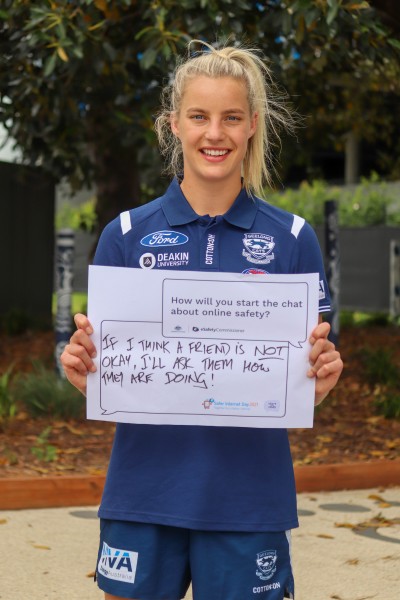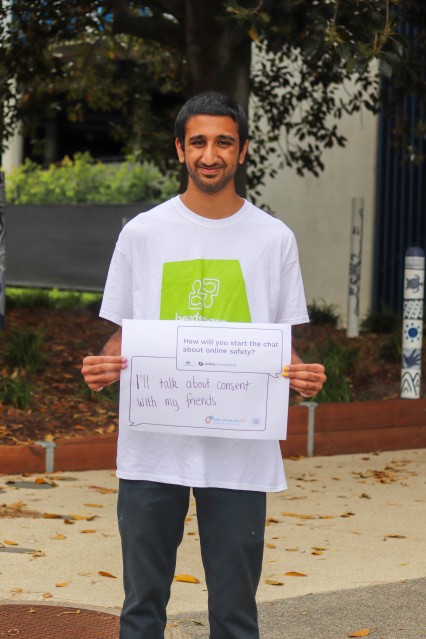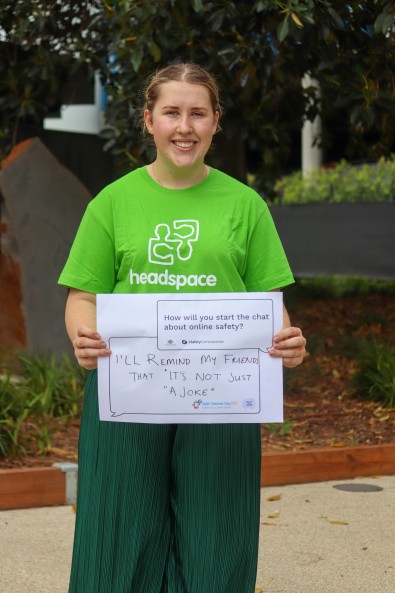Tips for looking out for yourself and your friends online

Over the past year, the internet has brought us together to work, learn, socialise and share more than ever. However, as wonderful as it is there’s lots of things online that can greatly effect a person’s mental health and wellbeing.
It's important to think about how our use of the internet effects us and the people around us, and what steps we can take to look after ourselves online. For #SaferInternetDay Cyber Cats ambassador, and Cats Vice-Captain, Jordan Ivey met with headspace Geelong Youth Ambassadors, Tori and Kyle, to chat about what they will start the chat about in regards to staying safe and happy online. Find more info on their tips below or find more tips at esafety.gov.au.
Jordi- If I think a friend is not okay, I'll ask them how they are doing.
If you notice your friend doesn't seem like themselves, reach out and ask them how they're going. Things you might notice are;
- Change in tone; if your friends posting a lot more or a lot less than usual or their types have posts have changed.
- Withdrawing; if your mates left a group chat or stopped replying to messages, check in on them.
- Posting late at night; are you waking up to snapchats from your friend from 2am? Not getting enough sleep or not being able to sleep can be a sign someone's mental health is struggling
- Sad, angry or distressed posts; if your friend is posting posts with a sad, distressed or angry undertones it might be that they need support.
It's important to trust your instincts, if you thinks somethings wrong it probably is, check in on your friends if you are worried about them. If you're unsure about how to reach out to a friend check out this article on supporting friends.
Kyle- I'll talk about consent with my friends 
Consent is just as important in the online space as it is offline. Although sending nudes, or 'sexting', can be part of a respectful, consensual, relationship often people can feel pressured to send nudes or have images re-shared without their consent.
Our Youth Ambassador, Kyle, is taking the opportunity today to talk to his friends about the importance of consent in the online space. The importance of not pressuring someone into sharing intimate images, knowing that it's not okay to share an intimate image of someone else and knowing that you have the power to say no.
If you have had a video or photo shared of you online make sure you seek support, you can contact the headspace Geelong team by calling 5222 6690 or submitting an online referral form.
You can also report it to the eSafety Commissioner who can help get the image removed and, in some cases take action against the perpetrator.
Tori- I'll remind my friends that it's not "just a joke"
Banter is meant to be light-hearted and friendly, but sometimes it can be taken too far, or escalate into bullying behaviour. You might not have intended to hurt someone’s feelings, but what you thought was friendly banter, could be considered bullying to someone else. Here is how you can help keep it friendly;
Don’t get too personal
Picking on someone’s appearance or aspects of their identity, like their gender, race, sexuality or religion, should not be material for funny banter. They might make fun of these things themselves, but it’s a good idea to avoid these topics altogether. Also, if this is someone you know really well, you probably already know some things that your friend is insecure about. If you are aware it is a sensitive subject, it’s best to not go there!
Saying ‘I was only joking’ after the fact, doesn’t help
Even if you really just mean it as a joke, it’s best to apologise if you made someone feel upset. Try not to argue about how you intended the joke to be taken. Doing this can often inflame the situation. Put yourself in their shoes for a moment and remember, the best way to fix the situation is to apologise.
 Don’t be a bystander
Don’t be a bystander
If you feel like someone is taking it too far in a group chat, maybe they’re just unaware of how they are making the other person feel. Gently point out to them that what they are saying can be taken the wrong way — you can do this by commenting on a post or by sending them a direct message. When they realise how they are making the other person feel, they’ll most likely let up. And if they don’t, report it or tell an adult you trust.
If you see that someone is clearly not taking someone else’s banter as a joke, reach out to them and ask them if they are OK. Let them know that they can get help and support.